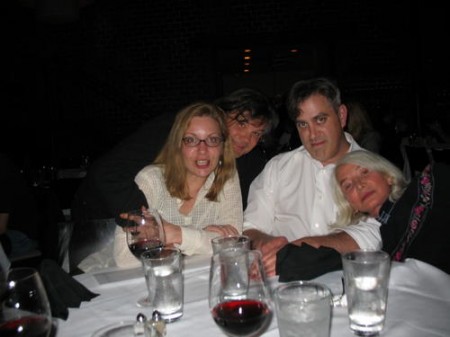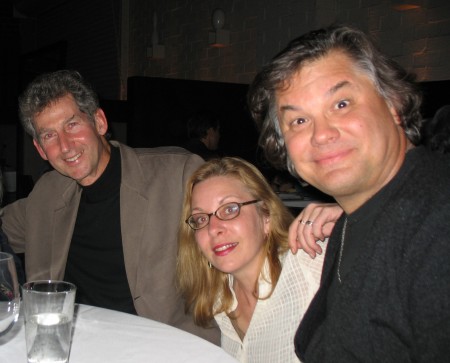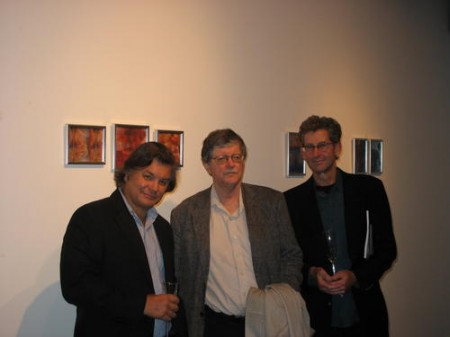I was re-reading a dissertation exam question, and I was somewhat surprised to discover that there has been no real transformation in my views on evil in more than a decade.
Question: Compare the language of cause, analysis, description, and solution to evil in Augustine, Nietzsche, Schüssler-Fiorenza and one author of your choice (Buber). Identify juxtapositions, similarities, opposition, etc., amongst the authors, and situate your own view.
The text of Augustine’s Confessions constructs an aesthetic metaphysics from within a post-Manichaean narrative of his intellectual and spiritual autobiography. Augustine modified (from Plotinus) the aesthetic idea of “plenitude,†in which the best creation is the creation that allows every possible kind of existence. For Augustine this implies a vertically-scaled hierarchy that I think of in terms of a ladder. God is both outside and at the top of this ladder, and God’s perfection of being and goodness stands as the immutable authority of measurement. Goodness is equated with being (or existence), since both go hand in hand up and down this ladder of the cosmic hierarchy. The gap between the separated top of the ladder and the rest describes the initial difference between God and God’s creation. Since Augustine believes that God created everything out of nothing (ex nihilo), the parts of creation “neither altogether are, not altogether are not, for they are, since they are from Thee, but are not, because they are not what Thou are. For that truly is which remains unchangeably†(VII, 17). As created, humans do not participate in God’s being.
constructs an aesthetic metaphysics from within a post-Manichaean narrative of his intellectual and spiritual autobiography. Augustine modified (from Plotinus) the aesthetic idea of “plenitude,†in which the best creation is the creation that allows every possible kind of existence. For Augustine this implies a vertically-scaled hierarchy that I think of in terms of a ladder. God is both outside and at the top of this ladder, and God’s perfection of being and goodness stands as the immutable authority of measurement. Goodness is equated with being (or existence), since both go hand in hand up and down this ladder of the cosmic hierarchy. The gap between the separated top of the ladder and the rest describes the initial difference between God and God’s creation. Since Augustine believes that God created everything out of nothing (ex nihilo), the parts of creation “neither altogether are, not altogether are not, for they are, since they are from Thee, but are not, because they are not what Thou are. For that truly is which remains unchangeably†(VII, 17). As created, humans do not participate in God’s being.
In order to argue against the idea of evil as a positive force or substance in opposition to the good, the order of goods and the order of being for Augustine are in terms of proper measure at each level of the hierarchy. Augustine employs the language of “privation†and “corruption†to describe both the proper tincture of being and non-being and the order of goods proper to the perspective of each level. “Privation†is a “taking away†(privatio), a lack, an absence, a loss – especially of something necessary to the functioning or flourishing of life. To Augustine, evil is “nothing but a privation of good, until at last a thing ceases altogether to be†(III, 12). This conflation of being and goodness allows him to describe a dynamic at each point of the ladder, in which the initial proper measurement is, again properly, sucked away. The violence of death, or even of privation as an act of depriving one in want or distress is not addressed in terms of any detraction from God’s perfection. Augustine’s interpretation of the Genesis narrative also authorizes him to place women in a state of greater “privation†than men (XIII, 47). However, privation is an optimistic term in the sense that it implies a sense of not-yet-realized potential and the possibility of replenishment. Since humans are twice-removed from God’s perfection, by creation and by the “fall,†our degree of goodness and existence has to do with staying on the proper rung and looking upwards. There is good on every level, but the measure of our loves should be in proportion and in priority to our God-given position. Sin is committed through an “immoderate inclination towards those goods of the lowest order†in which “the better and higher are forsaken†(II, 10). When we love in the wrong order, we are indirectly punished by God: “For Thou hast commanded, and so it is, that every inordinate affection should be its own punishment†(I, 19).
“Corruption†carries more negativity, suggesting the broken pieces of something that was whole. Only things that are mutable can be corrupted, and insofar as things of creation are in a state of “privation†of God’s perfect immutability of goodness and being, creation is corrupted by its mixture with non-being (voidness) as lack of goodness. Evil is not a substance, because a substance can be only insofar as it is good. In so far as a thing is corruptible, it is good, or else there would be nothing to corrupt (VII, 18). This suggests that humans need some form of metaphysical rust-proofing. But there is another sense in which “corruption†pertains, and for that Augustine has to rely on the Adamic “fall.†In this sense, evil consists in the self-originating act of pride of turning away from the highest good. Against the original turning away (down) from God in the context of free will, Augustine posits a genetic-spiritual transmission (literally, for Augustine, via the semen), in which we inherit this tendency. As a kind of contagion or infection, sinful pride (a misdirection of the will) is parasitic in a more thoroughgoing way than oxidation and the like might indicate.
The terms privation and corruption both place the blame for certain kinds of suffering on human will. Each individual has an inherited tendency and a free choice to will the inappropriate thing, thereby placing him or her in the “bondage†of sin. The solution to evil for Augustine is to turn to God for grace and salvation, to love God more than your own private good. In privation, turn to God for replenishment. In corruption, let God clean you and loose you from your chains. It is by the grace of God that the will is liberated from its servitude to sin. The only alternative to that choice is this: to the extent that we bring excessive non-being upon ourselves, we are subject to punishment (both at the time and in the life thereafter). While Augustine relies on an optimistic language, he requires the idea of hell to balance the results of human free-will against the totalizing economy of creation.
Nietzsche is not a Christian and offers no god’s-eye view since for him there is no absolute objective structure of the world existing independently of human apprehension. While Augustine can rely on a sense of extra-human authority, Nietzsche maintains that we construct value and meanings from particular perspectives and through our own actions. His analysis aims to be historically and linguistically genealogical, asking how ideas about morality have arisen. He describes evil primarily in terms of strength and weakness, or master and slave moralities (with frequent, somewhat Darwinian allusions to differences of function in the animal world). Although theses terms appear oppositional, Nietzsche stresses that they are more often expressed in terms of gradation and interpenetration, both in communities and in the same human being (Beyond Good & Evil , sec. 260).
, sec. 260).
Genealogically speaking, “evil†has been framed in terms of power that is sought by both the weak and the strong, but only exercised by the strong. Moral designations are first of all applied to human beings. The difference between good and evil – or good and bad – depends on one’s position. A master morality depicts itself as “noble†and therefore good in that it experiences the construction of its own values. Against its “triumphant affirmation†of itself in action (power and will), it sees weakness (flattery, humbleness, liars, doglike people who allow themselves to be mistreated) as “contemptible†(“bad†rather than evil). The “noble†has power in self-relation, has no need of pity, and honors others over a long run with gratitude or revenge (BGE, sec. 260). Ressentiment (resentment) arises from the slave morality, where slaves depict themselves as morally good, but dominated by evil masters who rule by fear. Their morality depends on a hostile external world against which they react with blame and a sometimes hidden imaginary of revenge (see On the Genealogy of Morals , first essay).
, first essay).
The conventionally Christian idea of “evil†for Nietzsche represents a slave morality since it is based on the fear of the power of others—a façade whereby the weak make of their weakness a moral strength and spread mediocrity while waiting for their revenge when their kingdom comes. Nietzsche’s criticism is more generally aimed at the illusion of absolutes, which for him inevitably revert to their opposites; what is framed as “immoral†is what happens. Christianity’s “morality†in no way increases actual sensitivity to others, but rather impoverishes instincts and drives. His assertion of “the death of God,†is not only an announcement of the end of metaphysics or of the effective function of the absolute. As Baudrillard reads Nietzsche (and I agree with its tenor), Nietzsche’s announcement also acts as a provocation and a challenge to God (or human ideas about God) to exist against the Christian image of God (supposing that there was only one such image).
The solution is a dismissal of the conventions of absolute terms, and a “transvaluation of values,†where the superhuman (Übermensch, which also includes the action of the subhuman “blond beast†or bird of prey) exercises willful power in a complex state of delight and love of fate—an individual Dionysian affirmation of the sovereignty of the self in the world. In sum, Nietzsche claims that we need to liberate ourselves from all conceptions of “morality†in order to be free to experience the constructions of our own sense of what morality might be outside the regulatory framings of power relationships.
Buber’s Images of Good and Evil (published as the second part of Good and Evil ) performs a phenomenology of structures of consciousness through readings of the Hebrew-biblical and Zoroastrian myths. Each account represents a different kind and stage of evil for human consciousness. He interprets both narratives, finally, in terms of differences in the language of decision, and although both kinds of evil are represented in each, he focuses on the Persian (Iranian) battle of the warring gods to describe the structure of evil as the decision to do wrong instead of right, to be false instead of true.
) performs a phenomenology of structures of consciousness through readings of the Hebrew-biblical and Zoroastrian myths. Each account represents a different kind and stage of evil for human consciousness. He interprets both narratives, finally, in terms of differences in the language of decision, and although both kinds of evil are represented in each, he focuses on the Persian (Iranian) battle of the warring gods to describe the structure of evil as the decision to do wrong instead of right, to be false instead of true.
Here I shall focus on his readings of the Hebraic bible accounts, which suggest that the soul has an urge that is “evil,†which is passion, and an urge that is “good,†which is directionality. Buber recasts evil as the sundering of these urges. Evil, or sin, is the “way†which fills the earth with violence as a result of a passionate, but directionless products of the “imaginaryâ€(GE, 91). To Buber, every imagined possibility entices the soul. The demonic danger that “lies in wait†when passion and direction are sundered is the “tension of omnipossibility†that exists as a result of the “vortex of indecision†of one’s soul.
Buber’s “demythologizing†interpretations of the biblical accounts are noteworthy in that he avoids the problems of Augustine’s fall-before-the-fall and condemnation of sexual desire. Passion and direction together are “very good.†His solution is not to extirpate the evil urge passion, but to reunite it with the good urge direction: to “yoke†the urges of evil and good back together in the service of God. This will “equip the absolute potency of passion with the one direction that renders it capable of great love and of great service†(GE, 92-97). He suggests a personal phenomenology in which you would meditate in a complete way upon an occurrence in which you seriously acknowledge, for yourself and not as a result of societal taboos, that you were bound up in the actuality of evil, either through decision or indecision. He suggests that when you really remember what it was like, you will see that in the “vortex†of possibilities were not “things,†but “possible ways of joining and overcoming them†(GE, 126). When the soul affirms the one direction in relation to which the soul is crystallized, it affirms its best in relation to God. Only the good of yoked passion and direction can be done from the position of this self-affirmation of decision. For each, this good is different, because we are all called differently by God.
Schüssler-Fiorenza does not describe evil, not even by a performance of its differences from conventional uses: the term itself disappears from the discourse. I see this absence functioning in different ways. It signals a refusal to re-invoke all conventional associations (especially as other, scapegoat, alien) on anything other than feminist terms. In this way, it also functions as an acceleration of the essential non-evil to which each of the other thinkers have subscribed.
In her biblical interpretations, Schüssler-Fiorenza theorizes (and practices) a feminist hermeneutics of evaluation in response to patriarchal structures of oppression, and a feminist hermeneutics of liberation that affirms the bodies and voices of women. There is an implicit language of description of evil in the former, and a language of solution in the latter. Androcentric language, phallogocentric representations of ultimate reality and authority, racism, colonial exploitation, sterotyping, and the like are all evaluated negatively in the context of a vision of freedom for women. The ultimate “litmus test†for invoking Scripture with authority “must be whether or not biblical texts and traditions seek to end relations of domination and exploitation†(BNS, xiii). Her writing is social, political, and pragmatic.
Her book Bread not stone: The challenge of feminist biblical interpretation describes a re-naming of God, church, scripture, and language. The structures of oppression and dehumanization that patriarchy has constructed in the metaphor of permanent “tablets of stone†is transformed to the image of bread that “nourishes, sustains, and energizes†women (there may be an implicit anti-Semitism in this transformation, but her point is the change in functional metaphor). Likewise, But She Said: Feminist Practices of Biblical Interpretation
describes a re-naming of God, church, scripture, and language. The structures of oppression and dehumanization that patriarchy has constructed in the metaphor of permanent “tablets of stone†is transformed to the image of bread that “nourishes, sustains, and energizes†women (there may be an implicit anti-Semitism in this transformation, but her point is the change in functional metaphor). Likewise, But She Said: Feminist Practices of Biblical Interpretation argues – through the words of the “resident alien,†expressed in the figure of the Syro-Phoenician woman who interrupts Jesus’ retreat to argue for her daughter – for the disruptive and “incendiary power†of the Word to transform discourses of “objectivist scientific or ecclesial doctrinal ethos into a critical rhetoric.†Her hermeneutic center is the notion of the ekklesia, taking from the ancient legislative assembly of citizens “called out” by the crier “the practice and vision of a discipleship of equals as the women-church”. The women-church collectively describes the men and women who struggle for liberation from patriarchal oppression and who are affected by biblical discourses.
argues – through the words of the “resident alien,†expressed in the figure of the Syro-Phoenician woman who interrupts Jesus’ retreat to argue for her daughter – for the disruptive and “incendiary power†of the Word to transform discourses of “objectivist scientific or ecclesial doctrinal ethos into a critical rhetoric.†Her hermeneutic center is the notion of the ekklesia, taking from the ancient legislative assembly of citizens “called out” by the crier “the practice and vision of a discipleship of equals as the women-church”. The women-church collectively describes the men and women who struggle for liberation from patriarchal oppression and who are affected by biblical discourses.
Her critical theology of liberation attempts to take responsibility for discourses in the recognition that “all language about the divine is incommensurate with divine reality†(BSS, 6) and that interpretation is historical and framed by varying imperatives and conditions. She focuses on a metaphorical space between the “logic of patriarchy†and the “logic of democracy†where emancipatory practices of interpretation might be engendered in biblical interpretation, by exploring not only what the text excludes, but also how the text constructs what it does include by tracing the “rhetorical moves, spaces, silences and crevices†of these two logics. Schüssler-Fiorenza’s constructions of affirmative possibility against kyriocentric (master-centered) readings of Scripture are already a practice of the solution that she describes.
Against all of the above thinkers, one could claim—and this would be my own tendency—that there is evil, and that evil and goodness exist in a very interdependent and interpenetrating relationship. A modified Manichean position such as this would be perspectival without complete relativism, where each temporary resting-place of constructed identity defines its own evils (usually in the process either of creating or being assaulted by them – or witnessing either). With Schüssler-Fiorenza, I would agree that evil and goodness can only be framed in terms of problematic subject-positions and institutional or communal conditions. A metaphysics such as Augustine’s is not possible. Efforts to imagine what a God’s-eye position would look like (such as Borges’ “The Aleph †or “The Library of Babelâ€) are interesting simply through the vertigo they induce. The God perspective, whatever that might mean, is not human nor does it translate easily to the human niche in the cosmos.
†or “The Library of Babelâ€) are interesting simply through the vertigo they induce. The God perspective, whatever that might mean, is not human nor does it translate easily to the human niche in the cosmos.
I think that there can be a will toward evil (in everyone to a greater or lesser extent at different times) in a predatory human agency that takes active delight in the observation and infliction of the suffering and pain of others. There can also be evil where there is not a specific will to evil or malicious enjoyment taken in the suffering of others, but where there is profound misunderstanding of the effects of what they do – particularly with the person who in a position to give aid and succor or at least kindess and compassion and refuses to do so. More generally, there is an ongoing dynamic of permeations of violence in active, passive, and complicit forms (with greater and lesser degrees of defensive rationalization or acceptance of responsibility for them). Any attempt to place them in a stable hierarchy has to fail, since space, place, temporality, and form are in states of reversals and metamorphosis.
Although I confine myself to notions of humanly-constructed (human, all too human) evils and systems of evil when theorizing, I am also fascinated by representations of inhuman evils in the American popular imagination. In the late twentieth-century, Americans seem to require more and more images of evil. What might this signify?
Buber’s phenomenological readings, like all other readings, simply re-mythologize what they intend to demythologize, in more or less convincing ways, to different communities, classes, genders, and so on. My objection to Buber’s Images of Good and Evil is that he claims to have described universal stable structures of consciousness from specifically-located myths. He assumes their influence on himself and his communal structures, but he does not show how these influences operate, nor is he conscious of the narrativity of his narrative. Against Buber’s claim that the soul can only crystallize in one direction, I suggest that it is fairly difficult, if not impossible to find just one direction, although two or three are sometimes possible. In my own experience, an additional problem is that any such crystallization tends to provide some of the conditions for the next problem. In this, I partly agree with Nietzsche, and am also influenced by Baudrillard’s notion of the “fatal†strategies of the object.
Schüssler-Fiorenza’s sense of ethics in biblical scholarship runs the risk of a “slave morality†in Nietzsche’s sense. To counter this, new perspectives and strategies for speaking with power and authority are required that do not simply re-instantiate the same old problems. When liberation discourse becomes authoritative, something is lost – the core of liberation and freedom without which the discourse is meaningless. Power itself is a metamorphizing mixture of good and evil. For example, the powerful uncovering of patriarchal oppression through the incendiary word can generate effects that uncover certain truths, while in a Heideggarian sense also serve to cover over the power relations between women: to separate those who fight for liberation openly from those who not, to separate believers from unbelievers, to assert supremacy of one community over another while pretending not to do so, to control the use of language, to encourage conformity in the very valorization of the claim to embrace difference, and so on.
A search for causes for evil seems to me – ultimately – futile, since causes are everywhere and nowhere. Only evil effects can be named with confidence. In a way, Heideggarian “thrownness†and “dasein†are inflected in the American sayings “you had to be there†and “wherever you are, there you are.†This is not to say that one has to inhabit a particular subject-position in order to describe it, but it does suggest that a better description might result from listening to the people who are “there.†This suggests something like a hermeneutics of multiple attentiveness.
There are also multiple methods of analysis that can be constructed, and each construction tells a more or less convincing narrative for a different group of people. As part of the dissertation project, I intend to explore some of changes in literary representations of evil in twentieth-century America. My method of analysis will be a somewhat postmodern eclectic one in the sense that it will that picks up theories as a bricoleur, as they seem pragmatically useful in the process of religious readings of literary texts. I do not subscribe to one particular discipline in isolation, or even to one theory in exclusion to all others, but am by nature and inclination intellectually interdisciplinary (although yes, I am well aware that this may be destructive to my future flourishing. As Martin Luther did, I can only post the note on the great door and state, “Here I stand. I can do no other.â€). I am suspicious of communal demands, but I welcome a deeper understanding of multiple social locations.
I have no idea what the solution to evil might look like, or if such a thing as a “solution†to evil is possible (I do most seriously doubt it).






